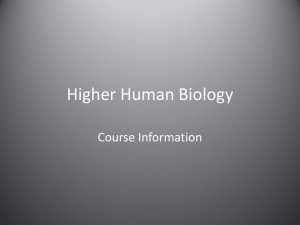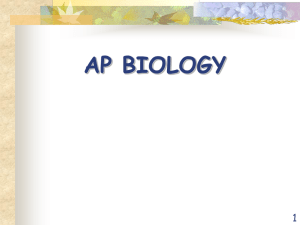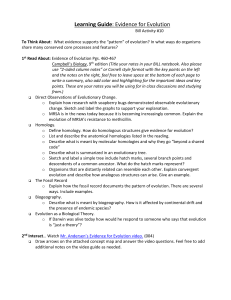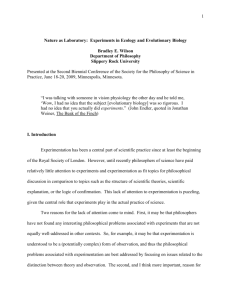BH201
advertisement
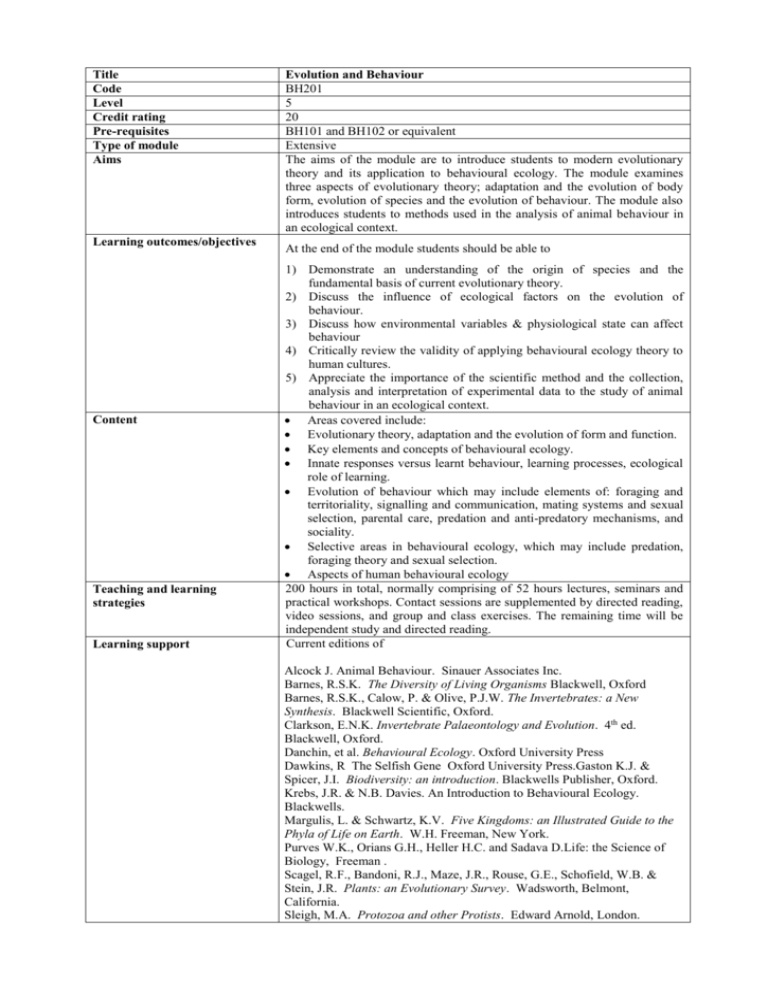
Title Code Level Credit rating Pre-requisites Type of module Aims Learning outcomes/objectives Content Teaching and learning strategies Learning support Evolution and Behaviour BH201 5 20 BH101 and BH102 or equivalent Extensive The aims of the module are to introduce students to modern evolutionary theory and its application to behavioural ecology. The module examines three aspects of evolutionary theory; adaptation and the evolution of body form, evolution of species and the evolution of behaviour. The module also introduces students to methods used in the analysis of animal behaviour in an ecological context. At the end of the module students should be able to 1) Demonstrate an understanding of the origin of species and the fundamental basis of current evolutionary theory. 2) Discuss the influence of ecological factors on the evolution of behaviour. 3) Discuss how environmental variables & physiological state can affect behaviour 4) Critically review the validity of applying behavioural ecology theory to human cultures. 5) Appreciate the importance of the scientific method and the collection, analysis and interpretation of experimental data to the study of animal behaviour in an ecological context. Areas covered include: Evolutionary theory, adaptation and the evolution of form and function. Key elements and concepts of behavioural ecology. Innate responses versus learnt behaviour, learning processes, ecological role of learning. Evolution of behaviour which may include elements of: foraging and territoriality, signalling and communication, mating systems and sexual selection, parental care, predation and anti-predatory mechanisms, and sociality. Selective areas in behavioural ecology, which may include predation, foraging theory and sexual selection. Aspects of human behavioural ecology 200 hours in total, normally comprising of 52 hours lectures, seminars and practical workshops. Contact sessions are supplemented by directed reading, video sessions, and group and class exercises. The remaining time will be independent study and directed reading. Current editions of Alcock J. Animal Behaviour. Sinauer Associates Inc. Barnes, R.S.K. The Diversity of Living Organisms Blackwell, Oxford Barnes, R.S.K., Calow, P. & Olive, P.J.W. The Invertebrates: a New Synthesis. Blackwell Scientific, Oxford. Clarkson, E.N.K. Invertebrate Palaeontology and Evolution. 4th ed. Blackwell, Oxford. Danchin, et al. Behavioural Ecology. Oxford University Press Dawkins, R The Selfish Gene Oxford University Press.Gaston K.J. & Spicer, J.I. Biodiversity: an introduction. Blackwells Publisher, Oxford. Krebs, J.R. & N.B. Davies. An Introduction to Behavioural Ecology. Blackwells. Margulis, L. & Schwartz, K.V. Five Kingdoms: an Illustrated Guide to the Phyla of Life on Earth. W.H. Freeman, New York. Purves W.K., Orians G.H., Heller H.C. and Sadava D.Life: the Science of Biology, Freeman . Scagel, R.F., Bandoni, R.J., Maze, J.R., Rouse, G.E., Schofield, W.B. & Stein, J.R. Plants: an Evolutionary Survey. Wadsworth, Belmont, California. Sleigh, M.A. Protozoa and other Protists. Edward Arnold, London. Webster, J. Introduction to Fungi. Cambridge University Press, Cambridge. Wilson, E.O. The Diversity of Life. Harvard University Press. Assessment tasks Brief description of module content and/or aims (maximum 80 words) Area examination board to which module relates Module team/authors/coordinator Semester offered, where appropriate Site where delivered Date of first approval Date of last revision Date of approval of this version Version number Replacement for previous module Field for which module is acceptable and status in that course Course(s) for which module is acceptable and status in that course School home External examiner The module will be supported by supplementary material and links placed on the StudentCentral. 100% coursework comprising three components: 1. An unseen test (MCQ & short answers) (25%) (LO 2, 3) 2. Two write-ups from practical classes (25% each overall 50%) (LO 5) 3. A short essay of maximum 2000 words (25%) (LO1,4) The module aims to introduce students to evolutionary theory and its application to understanding observed behavioural ecology of animals and humans. The module examines three aspects of evolutionary theory; adaptation and the evolution of body form, evolution of species and the evolution of behaviour. Biology and Biomedical Sciences Dr Angelo Pernetta (module leader) and other members of Biology Division 1 UCH/Moulsecoomb 2008 2008 2011 2 n/a Biology/Ecology, Optional Environmental Biology, Compulsory BA Joint Hons. Environmental Biology & Education, Compulsory BSc. Joint Hons Biology, Compulsory BSc. Joint Hons. Environmental Biology & Education, Compulsory Pharmacy and Biomolecular Sciences Diana Bell
